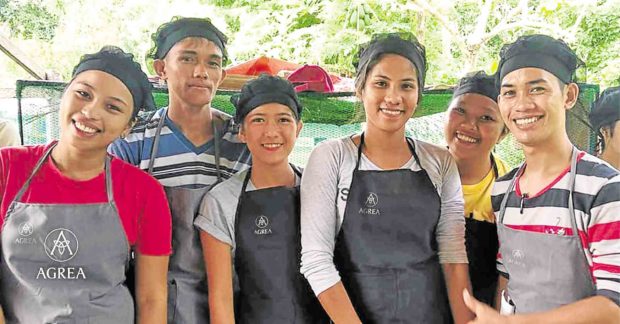
Agrea Farm School, Tesda Marinduque expand assistance to deserving organic farming scholars. —PHOTO FROM AGREAPH.COM
The Philippines is an agricultural country with a land area of 30 million hectares, 47 percent of which is agricultural land.
We have rich land, natural resources, hardworking farmers and agri research institutions. We are blessed with so many resources.
However, we did not really prioritize agriculture, which is among the backbones of our economy. Thus, we have been left behind.
But we cannot just allow our limitations—like the lack of infrastructure on irrigation, farm-to-market road, constraint in farmers’ access to capital, technologies, market, mechanization and comprehensive capacity building—hinder the progress of the agriculture sector.
We need to take solid action. This action must not only be done by the government but by different stakeholders including private agribusinesses, nongovernment organizations, international organizations with agriculture programs, as well as the academe that produces our agriculture experts and research institutions.
Master plan
It’s best to have a holistic national food security master plan and road map for Philippine agriculture as the population is exponentially growing while our production is going in the opposite direction.
This master plan and road map must be known by even the smallest political unit of our society, so that everyone knows what they need in terms of agriculture and can therefore set better targets that form the basis of budgets and programs.
It’s best to have an integrated management approach to our smallholder farmers, for them to reach economies of scale to help sufficiently, consistently and efficiently supply the market.
When smallholder farmers are grouped together, they have a stronger voice to seek support from the government as well as the private sector.
They will also be able to negotiate better terms with traders.
It is unfortunate that agriculture is no longer palatable to young people, unless we entice the youth to consider agribusiness.
For many people, agriculture is still a one-way ticket to poverty.
Even the farmers tell their children not to follow their footsteps. They are instead advised to study hard to be able to work abroad and then send money back home.
Production-focused agriculture is not exciting for young people, but an agribusiness-focused agriculture is important for everyone to see that there is money in farming.
Digitalizing agriculture is also a great way to boost the sector together with farm mechanization that follows sustainable agricultural practices.
Until now, most of our farmers’ names and profiles are still on an excel sheet within government offices.
We don’t have any database of farmers in the Philippines. Neither do we have a fair-trading system that could change how the producers, traders and consumers work together in a more transparent way.
Farmers couldn’t negotiate their farmgate price. Consumers have no choice but to accept inflated prices and traders bring the goods to the market without proper regulation.
The middlemen also serve a purpose, however, there’s room to adopt more ethical practices.
Farm tourism is also a great addition to the agrisector.
This can bring value addition to farmers and at the same time, generate more jobs.
Most destination farms in the Philippines are also practising ecofriendly approaches to farming and focusing on sustainability.
As the farm is developing, it employs people around the area and at the same time, the community is able to take good care of the environment, which is a great package to promote tourism.
Finally, let’s revive and revitalize this dying sector that feeds all of us.
We need to do this together.
(Atilano (Asia21 Class of 2017) is founder and CEO of Marinduque-based AGREA, which aims to create a living model of a replicable one-island economy that promotes livelihood indigenous to the land. Asia Society Philippines will host the 2018 Asia 21 global summit from Nov. 14 to 16. For more information, visit www.asiasociety.org/Philippines.